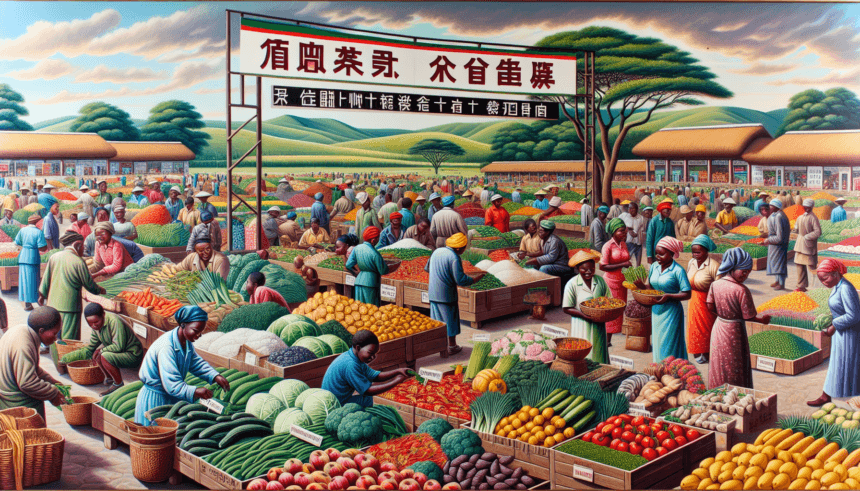Main Points In Hindi (मुख्य बातें – हिंदी में)
-
चीनी बाजार की संभावनाएँ: जिम्बाब्वे की कृषि उत्पादों के लिए चीनी बाजार खुलने से निर्यात में विविधता लाने की दिशा में मदद मिली है, खासकर चीनी मध्यम वर्ग की बढ़ती खरीद शक्तियों के चलते।
-
आवश्यक प्रोटोकॉल और सहयोग: जिम्बाब्वे और चीन के बीच हाल में साइन किए गए फाइटोसैनिटरी आवश्यकताओं के प्रोटोकॉल से जिम्बाब्वे के एवोकैडो के निर्यात की संभावनाएँ बढ़ी हैं।
-
अफ्रीकी कृषि में निवेश की कमी: मुत्सवांगवा के अनुसार, अफ्रीका में कृषि में निवेश की कमी ने खाद्य असुरक्षा को जन्म दिया है, जबकि चीन जैसे देशों में उच्च गुणवत्ता वाले अफ्रीकी उत्पादों के लिए बढ़ती माँग देखी जा रही है।
-
तंबाकू व्यापार का विस्तार: जिम्बाब्वे के तंबाकू उत्पादों की मांग चीन में बढ़ी है, जिससे व्यापार में वृद्धि हुई है और नई कृषि उत्पादों की निर्यात योजनाएँ सामने आई हैं।
- विस्तारित व्यापार संभावनाएँ: जिम्बाब्वे अब साइट्रस, मैकाडामिया और अन्य कृषि उपज के निर्यात को बढ़ाने की कोशिश कर रहा है, साथ ही चीनी कृषि उपकरण और मशीनरी के आयात के लिए नए अवसर भी उत्पन्न हो रहे हैं।
Main Points In English(मुख्य बातें – अंग्रेज़ी में)
Here are the main points from the article:
-
Opening of Chinese Market: Zimbabwe’s efforts to diversify its agricultural exports have been bolstered by the opening of the Chinese market for its products, according to a senior official from the ruling Zimbabwe African National Union-Patriotic Front (ZANU-PF).
-
Growing Middle Class in China: The increase in China’s middle class has resulted in changing food preferences, leading to a greater interest in diverse agricultural products from countries like Zimbabwe, which presents an opportunity for increased exports.
-
Investment in Agriculture: The article highlights the lack of investment in African agriculture, which has resulted in food insecurity despite the continent’s agricultural potential. There is a growing demand for quality African products, particularly in Asian markets.
-
Tobacco and Citrus Exports: China presents an attractive market for Zimbabwean tobacco, with significant trade already established. The approval of protocols for exporting other products like citrus and macadamia nuts reflects Zimbabwe’s goals of diversifying its agricultural exports.
- Trade Dynamics with China: Trade data between Zimbabwe and China indicate a positive trend, suggesting increased opportunities in agricultural trade and the potential for importing Chinese agricultural machinery and equipment, which could enhance farming capabilities in Zimbabwe.


Complete News In Hindi(पूरी खबर – हिंदी में)
हरारे, 26 नवंबर (शिन्हुआ) — जिम्बाब्वे की कृषि उपज के लिए चीनी बाजार खुलने से निर्यात में विविधता लाने के देश के प्रयासों को गति मिली है, जिम्बाब्वे की सत्तारूढ़ पार्टी के एक वरिष्ठ अधिकारी ने कहा है।
ज़िम्बाब्वे के सत्तारूढ़ ज़िम्बाब्वे अफ़्रीकी नेशनल यूनियन-पैट्रियोटिक फ्रंट (ज़ेनयू पीएफ) पार्टी पोलित ब्यूरो के सदस्य और सूचना और प्रचार के लिए ज़ेनयू पीएफ सचिव क्रिस्टोफर मुत्सवांगवा ने हाल ही में एक साक्षात्कार में सिन्हुआ को बताया कि देश चीन के उच्च-स्तरीय खुलेपन को बढ़ावा देने के लिए पूंजीकरण करने को तैयार है। विकास।
“अफ्रीकी कृषि के लिए अब यह एक रोमांचक अवधि है क्योंकि चीन ने एक बड़ी मध्यम वर्ग की आबादी विकसित की है। उनके स्वाद बदल रहे हैं, वे चीन से परे विभिन्न क्षेत्रों के भोजन में भी रुचि ले रहे हैं। और उनके पास खर्च करने की शक्ति है, खर्च करने योग्य आय है दुनिया में कहीं और से कोई भी अच्छी गुणवत्ता वाला भोजन खरीदने के लिए, “मुत्सवांगवा ने कहा, जो चीन में जिम्बाब्वे के पूर्व राजदूत भी हैं।
हाल के वर्षों में, दक्षिणी अफ्रीकी देश से कृषि उत्पादों की बढ़ती विविधता ने चीनी बाजार में अपनी जगह बना ली है, जो चीन द्वारा अफ्रीकी उत्पादों के लिए अपने बाजार को खोलने और अफ्रीकी देशों से आयात का विस्तार करने के लिए तरजीही नीतियों के कार्यान्वयन से प्रेरित है।
सितंबर की शुरुआत में चीन-अफ्रीका सहयोग फोरम के 2024 शिखर सम्मेलन के दौरान, चीन और जिम्बाब्वे ने चीन को जिम्बाब्वे के एवोकैडो के निर्यात के लिए फाइटोसैनिटरी आवश्यकताओं के लिए एक प्रोटोकॉल पर हस्ताक्षर किए।
मुत्सवांगवा ने कहा कि कृषि में निवेश की कमी के कारण अफ्रीका पर्याप्त भोजन का उत्पादन नहीं कर पाया है, जिसके परिणामस्वरूप कृषि भूमि की प्रचुरता के बावजूद खाद्य असुरक्षा पैदा हो गई है।
“अफ्रीकी कृषि में निवेश की कमी थी। पश्चिमी देशों द्वारा अफ्रीकी कृषि में निवेश फैंसी खाद्य फसलों और अन्य फसलों में था जो उपभोग के लिए नहीं थे, जैसे कोको और तंबाकू। ये ऐसी फसलें थीं जिन्हें पश्चिमी देश अपने उद्योगों के लिए चाहते थे,” उसने कहा।
उन्होंने कहा, चीन और बड़े मध्यम वर्ग वाले अन्य एशियाई देशों के आगमन के साथ, गुणवत्ता वाले अफ्रीकी उत्पादों की मांग बढ़ गई है। “तो, यह अफ्रीकी कृषि के लिए वैश्विक खाद्य मूल्य श्रृंखला का हिस्सा बनने का एक मौका है।”
तंबाकू के उत्पादन पर, जिम्बाब्वे के प्रमुख विदेशी मुद्रा अर्जक में से एक, मुत्सवांगवा ने कहा कि चीन में तंबाकू के पत्ते की मांग ने जिम्बाब्वे के तंबाकू के लिए एक आकर्षक और तैयार बाजार तैयार किया है।
मुत्सवांगवा ने कहा, “दुनिया की सबसे बड़ी तंबाकू कंपनी, चाइना टोबैको, 2004 में जिम्बाब्वे आई और निवेश करना शुरू किया। और आज, अकेले चीन के साथ तंबाकू का व्यापार लाखों अमेरिकी डॉलर का है।”
उन्होंने कहा कि चीन को तंबाकू जैसी फसलों के निर्यात में सफलता के बाद, जिम्बाब्वे अब अन्य उत्पादों में विविधता लाने का लक्ष्य बना रहा है। “हम बहुत खुश हैं कि चीन ने अब जिम्बाब्वे के साइट्रस (चीनी बाजार में) की अनुमति दे दी है। हमें अपना उत्पादन बढ़ाने की जरूरत है क्योंकि यह एक बड़ा बाजार है। याद रखें, यह 1.4 बिलियन लोग हैं। इसलिए हमारा वर्तमान उत्पादन अभी भी चीन से बहुत कम है उम्मीद है।”
उन्होंने कहा कि चीन को साइट्रस और मैकाडामिया निर्यात को हरी झंडी मिलने के साथ, जिम्बाब्वे में तिल और अन्य कृषि उपज का निर्यात करने की भी क्षमता है। “मुझे एक बहुत उज्ज्वल संभावना दिख रही है और मुझे अब खुशी है कि हमारे सीमा शुल्क विभाग और कृषि में हमारे फाइटोसैनिटरी विभाग सूचनाओं का आदान-प्रदान कर रहे हैं और समझौतों पर हस्ताक्षर कर रहे हैं। और चीनी टीमें जिम्बाब्वे की क्षमता का निरीक्षण करने के लिए आ रही हैं।”
व्यापार पोर्टफोलियो के विस्तार के साथ, चीन और जिम्बाब्वे के बीच व्यापार आंकड़ों ने सकारात्मक प्रक्षेपवक्र दिखाया है।
चीन से जिम्बाब्वे के आयात पर टिप्पणी करते हुए उन्होंने कहा कि अधिक चीनी कृषि उपकरण और मशीनरी भी जिम्बाब्वे के बाजार में अपनी जगह बना सकते हैं क्योंकि कृषि उत्पादों में बढ़ता व्यापार नए अवसर पैदा करता है।
“तो, संभावनाएं बहुत आशाजनक हैं, फसलों के व्यापार में और चीन से उपकरणों की खरीद में, बल्कि चीनी खाद्य दिग्गजों द्वारा पूंजी निवेश में भी यह सुनिश्चित करने के लिए कि हमारे पास जिम्बाब्वे के क्षेत्र से लेकर चीन तक एक संपूर्ण मूल्य श्रृंखला है। चीन में सुपरमार्केट, “मुत्सवांगवा ने कहा। ■
Complete News In English(पूरी खबर – अंग्रेज़ी में)
Harare, November 26 (Xinhua) — The opening of the Chinese market for Zimbabwe’s agricultural products is boosting the country’s efforts to diversify its exports, according to a senior official from Zimbabwe’s ruling party.
Christopher Mutsvangwa, a member of the Politburo of the ruling Zimbabwe African National Union-Patriotic Front (ZANU-PF) and the party’s secretary for information and publicity, recently told Xinhua in an interview that the country is ready to capitalize on China’s push for greater openness to promote its development.
“This is an exciting time for African agriculture as China has developed a large middle class. Their tastes are changing, and they are interested in food from various regions beyond just China. They have the purchasing power and disposable income to buy quality food from anywhere in the world,” Mutsvangwa said, who is also a former Zimbabwean ambassador to China.
In recent years, the growing variety of agricultural products from the Southern African nation has found a place in the Chinese market, spurred by China’s implementation of preferential policies to open its market to African products and increase imports from African countries.
During the recent Forum on China-Africa Cooperation summit in September 2024, China and Zimbabwe signed a protocol on phytosanitary requirements for the export of avocados from Zimbabwe to China.
Mutsvangwa noted that a lack of investment in agriculture has prevented Africa from producing enough food, leading to food insecurity despite having plenty of agricultural land.
“There has been a lack of investment in African agriculture. The investments from Western countries were focused on high-value crops that were not for local consumption, like cocoa and tobacco. These were crops that Western countries wanted for their industries,” he said.
He added that with the arrival of China and other Asian countries with large middle classes, the demand for quality African products has increased. “This is a chance for African agriculture to become part of the global food value chain.”
On the topic of tobacco production, one of Zimbabwe’s main sources of foreign currency, Mutsvangwa said the demand for tobacco leaves in China has created an attractive market for Zimbabwean tobacco.
“The world’s largest tobacco company, China Tobacco, began investing in Zimbabwe in 2004. Today, the trade in tobacco with China alone amounts to millions of US dollars,” Mutsvangwa stated.
He mentioned that after succeeding in exporting tobacco, Zimbabwe is now aiming to diversify into other products. “We are very pleased that China has now allowed Zimbabwean citrus to enter its market. We need to increase our production since it is a huge market. Remember, it consists of 1.4 billion people. Therefore, our current production is still very low compared to expectations from China.”
With China clearing the way for citrus and macadamia exports, Zimbabwe also has the potential to export sesame seeds and other agricultural products. “I see very bright prospects, and I am happy that our customs and phytosanitary departments are exchanging information and signing agreements. Chinese teams are visiting Zimbabwe to assess our capabilities.”
With the expansion of the trade portfolio, trade figures between China and Zimbabwe show a positive trend.
Regarding imports from China, he pointed out that more Chinese agricultural equipment and machinery could also secure a place in the Zimbabwean market as the rising trade in agricultural products creates new opportunities.
“So, the prospects are very promising, both in crop trade and in purchasing equipment from China, as well as in capital investments by Chinese food giants to ensure a complete value chain from Zimbabwe to China, including in Chinese supermarkets,” Mutsvangwa concluded. ■








